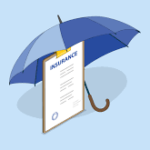Insurance Policies
In today’s fast-paced world, where uncertainties loom large, insurance has become a cornerstone for safeguarding against unforeseen risks. With a myriad of insurance policies available in the market, navigating through the options to find the most suitable coverage can be daunting. However, fear not, for we are here to unveil the top 10 insurance policies that provide comprehensive coverage and invaluable peace of mind.

1. Life Insurance
Life is unpredictable, and having life insurance ensures financial security for your loved ones in the event of your untimely demise. Whether it’s term life, whole life, or universal life insurance, each offers unique benefits tailored to meet your specific needs.
2. Health Insurance
Your health is your most valuable asset, and health insurance ensures access to quality healthcare without the burden of exorbitant medical expenses. From individual plans to family coverage, choose a policy that provides comprehensive benefits and extensive network coverage.
3. Auto Insurance
Protecting your vehicle against unforeseen accidents and liabilities is paramount. Auto insurance offers coverage for damages, theft, and third-party liabilities, ensuring peace of mind every time you hit the road.
4. Homeowners Insurance
Your home is more than just a shelter; it’s a sanctuary. Homeowners insurance safeguards your property and belongings against damage from natural disasters, theft, and accidents, providing financial protection and peace of mind for you and your family.
5. Renter’s Insurance
Even if you don’t own a home, protecting your belongings is crucial. Renter’s insurance provides coverage for personal belongings, liability protection, and additional living expenses in the event of a covered loss, ensuring peace of mind for tenants.
6. Disability Insurance
Your ability to earn an income is your most valuable asset. Disability insurance provides income replacement in the event of a disability that prevents you from working, ensuring financial stability and continuity for you and your loved ones.
7. Long-Term Care Insurance
As you age, the need for long-term care may arise. Long-term care insurance provides coverage for services such as nursing home care, assisted living, and in-home care, offering financial security and peace of mind during your golden years.
8. Pet Insurance
Pets are cherished members of the family, and their health and well-being are paramount. Pet insurance covers veterinary expenses for accidents, illnesses, and preventive care, ensuring your furry friends receive the care they deserve without financial constraints.
9. Travel Insurance
Whether you’re traveling for business or leisure, unforeseen circumstances can disrupt your plans. Travel insurance offers coverage for trip cancellations, medical emergencies, lost baggage, and other travel-related risks, ensuring a worry-free journey.
10. Business Insurance
Entrepreneurship comes with its own set of risks, and business insurance provides protection against property damage, liability claims, and other unforeseen events that could jeopardize your business’s success and financial stability.
In today’s unpredictable world, insurance serves as a vital safety net, providing financial protection against unforeseen events. With a myriad of insurance options available, it can be challenging to navigate through the sea of policies to find the most suitable coverage. This guide aims to shed light on the top 10 insurance policies, offering insights to empower individuals and businesses to make informed decisions about their coverage needs.

- Health Insurance: Health insurance tops the list as one of the most essential forms of coverage. It helps offset the high costs of medical treatment, including doctor visits, hospitalization, and prescription drugs. With the rising healthcare expenses, having adequate health insurance can safeguard your finances and ensure access to quality medical care when needed.
- Life Insurance: Life insurance provides financial protection to your loved ones in the event of your untimely demise. It serves as a crucial tool for income replacement, debt repayment, and covering funeral expenses. Depending on your needs, you can choose from various types of life insurance, such as term life, whole life, or universal life policies.
- Auto Insurance: Auto insurance is mandatory in most jurisdictions and covers damages resulting from car accidents, theft, or vandalism. It provides liability protection for bodily injury and property damage caused to others, as well as coverage for your vehicle’s repairs or replacement. Understanding the different coverage options is key to selecting the right auto insurance policy.
- Homeowners Insurance: For homeowners, protecting their most significant investment is paramount. Homeowners insurance offers financial security against losses or damages to your home and personal belongings due to fire, theft, natural disasters, or other covered perils. It also provides liability coverage for accidents that occur on your property.
- Disability Insurance: Disability insurance replaces a portion of your income if you become unable to work due to a disabling illness or injury. It ensures financial stability by providing monthly benefits to cover living expenses, mortgage payments, and other financial obligations during your disability period. Both short-term and long-term disability insurance options are available.
- Business Insurance: Business insurance safeguards enterprises against various risks, including property damage, liability claims, and business interruption. It encompasses a wide range of coverage, such as general liability, professional liability (errors and omissions), property insurance, and workers’ compensation. Tailoring your business insurance portfolio to your specific industry and risks is crucial.
- Umbrella Insurance: Umbrella insurance offers an extra layer of liability protection beyond the limits of your existing insurance policies, such as auto or homeowners insurance. It helps shield your assets from lawsuits and costly legal judgments by providing additional coverage for liability claims that exceed your primary policy limits.
- Travel Insurance: Travel insurance provides coverage for unexpected events that can disrupt your trip, such as trip cancellation, lost luggage, medical emergencies abroad, or travel delays. It offers peace of mind while traveling by mitigating financial losses and ensuring access to assistance services, especially when journeying to foreign destinations.
- Pet Insurance: Pet insurance has gained popularity as pet owners seek to mitigate veterinary expenses associated with their furry companions’ health care needs. It covers veterinary treatments, surgeries, medications, and other medical expenses for pets in case of illness, accidents, or injuries. Pet insurance policies vary in coverage options and exclusions, so it’s essential to review the terms carefully.
- Cyber Insurance: With the increasing prevalence of cyber threats and data breaches, cyber insurance has become indispensable for businesses of all sizes. It provides financial protection against losses resulting from cyberattacks, including data breaches, ransomware attacks, and business interruption. Cyber insurance policies typically cover expenses related to forensic investigations, data restoration, legal fees, and liability claims.
Frequently Asked Questions (FAQ) about Insurance
- What is insurance? Insurance is a contractual agreement between an individual or entity (the policyholder) and an insurance company. In exchange for regular premium payments, the insurance company provides financial protection against specified risks or losses.
- Why do I need insurance? Insurance offers financial security and peace of mind by mitigating the financial consequences of unexpected events. It helps protect your assets, health, and income from risks such as accidents, illnesses, natural disasters, or liability claims.
- How do I choose the right insurance policy? Choosing the right insurance policy depends on your specific needs, lifestyle, and financial situation. Consider factors such as coverage options, deductibles, premiums, policy limits, and exclusions. It’s essential to assess your risks and research different insurance providers to find the most suitable coverage.
- What types of insurance are available? There are various types of insurance available to cover different aspects of life and business, including health insurance, life insurance, auto insurance, homeowners insurance, renters insurance, disability insurance, business insurance, travel insurance, pet insurance, and cyber insurance, among others.
- Is insurance mandatory? Some types of insurance, such as auto insurance and workers’ compensation insurance, are mandatory in many jurisdictions. However, other types of insurance, such as life insurance or homeowners insurance, are typically optional but highly recommended for financial protection.
- How are insurance premiums determined? Insurance premiums are determined based on various factors, including the insured individual’s age, health status, occupation, location, lifestyle habits, coverage limits, deductibles, and the insurance company’s underwriting criteria. Generally, individuals with higher risks may face higher premiums.
- What is a deductible? A deductible is the amount of money the policyholder must pay out of pocket before the insurance coverage kicks in. For example, in health insurance, if you have a $500 deductible and incur $2,000 in covered medical expenses, you would pay the first $500, and the insurance company would cover the remaining $1,500.
- What is the difference between term life and whole life insurance? Term life insurance provides coverage for a specified period (e.g., 10, 20, or 30 years) and pays out a death benefit if the insured individual passes away during the term of the policy. Whole life insurance, on the other hand, provides coverage for the insured’s entire life and includes a cash value component that accumulates over time.
- Can I cancel my insurance policy? Yes, most insurance policies allow policyholders to cancel their coverage at any time. However, depending on the terms of the policy, you may be subject to cancellation fees or penalties. It’s essential to review the policy terms and consult with your insurance provider before canceling your coverage.
- What should I do if I need to file an insurance claim? If you need to file an insurance claim, contact your insurance provider as soon as possible to report the incident and initiate the claims process. Be prepared to provide relevant details, such as the date, time, and location of the incident, a description of what occurred, and any documentation or evidence supporting your claim. Follow the instructions provided by your insurance company and cooperate fully throughout the claims process to ensure a smooth resolution


